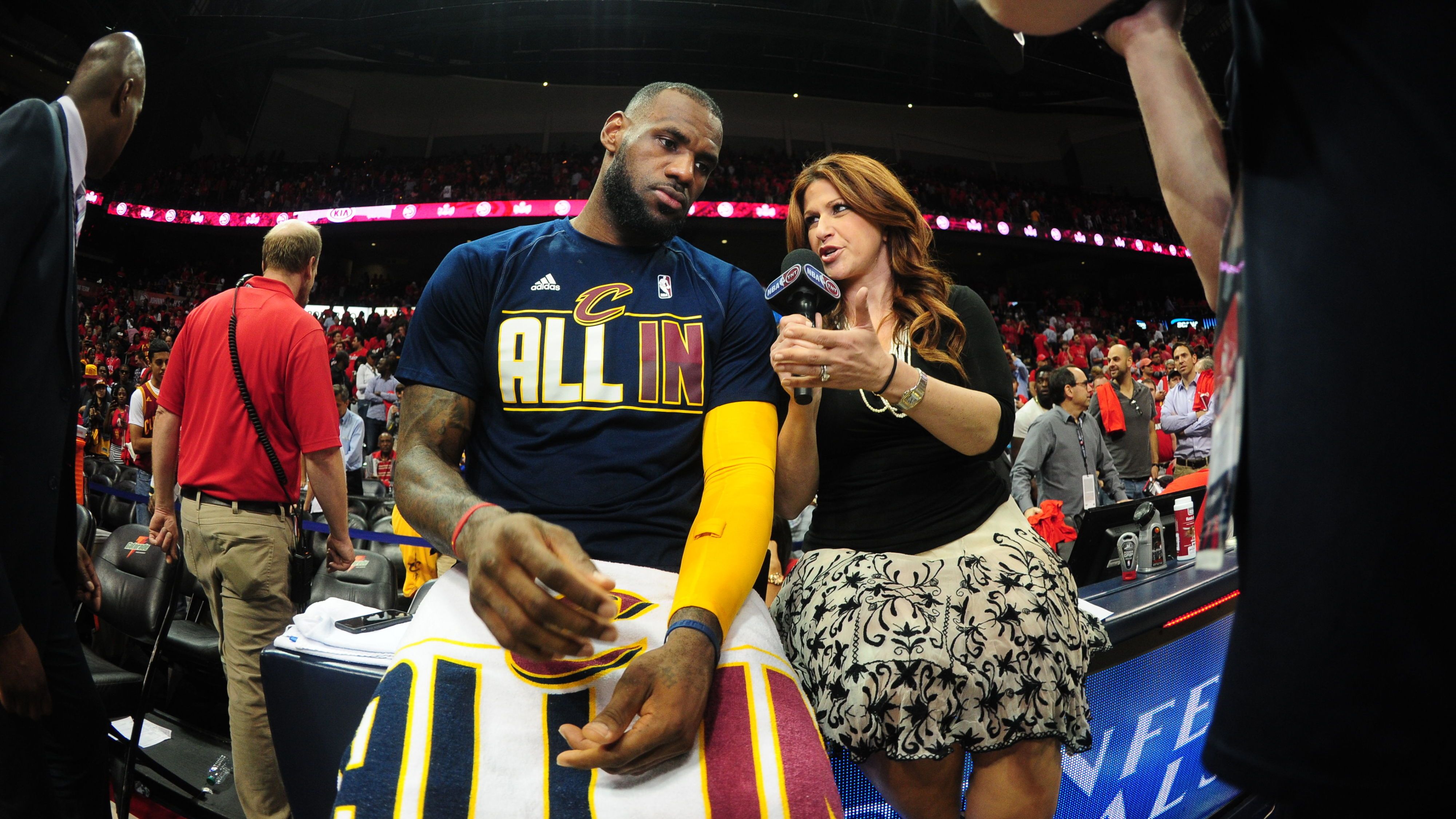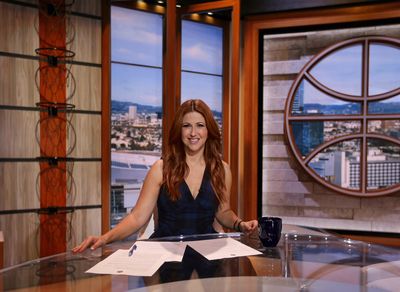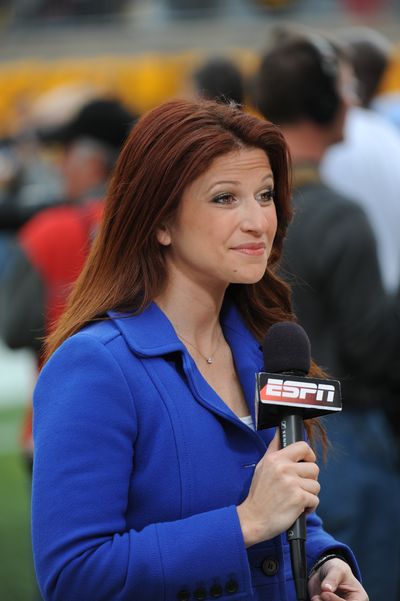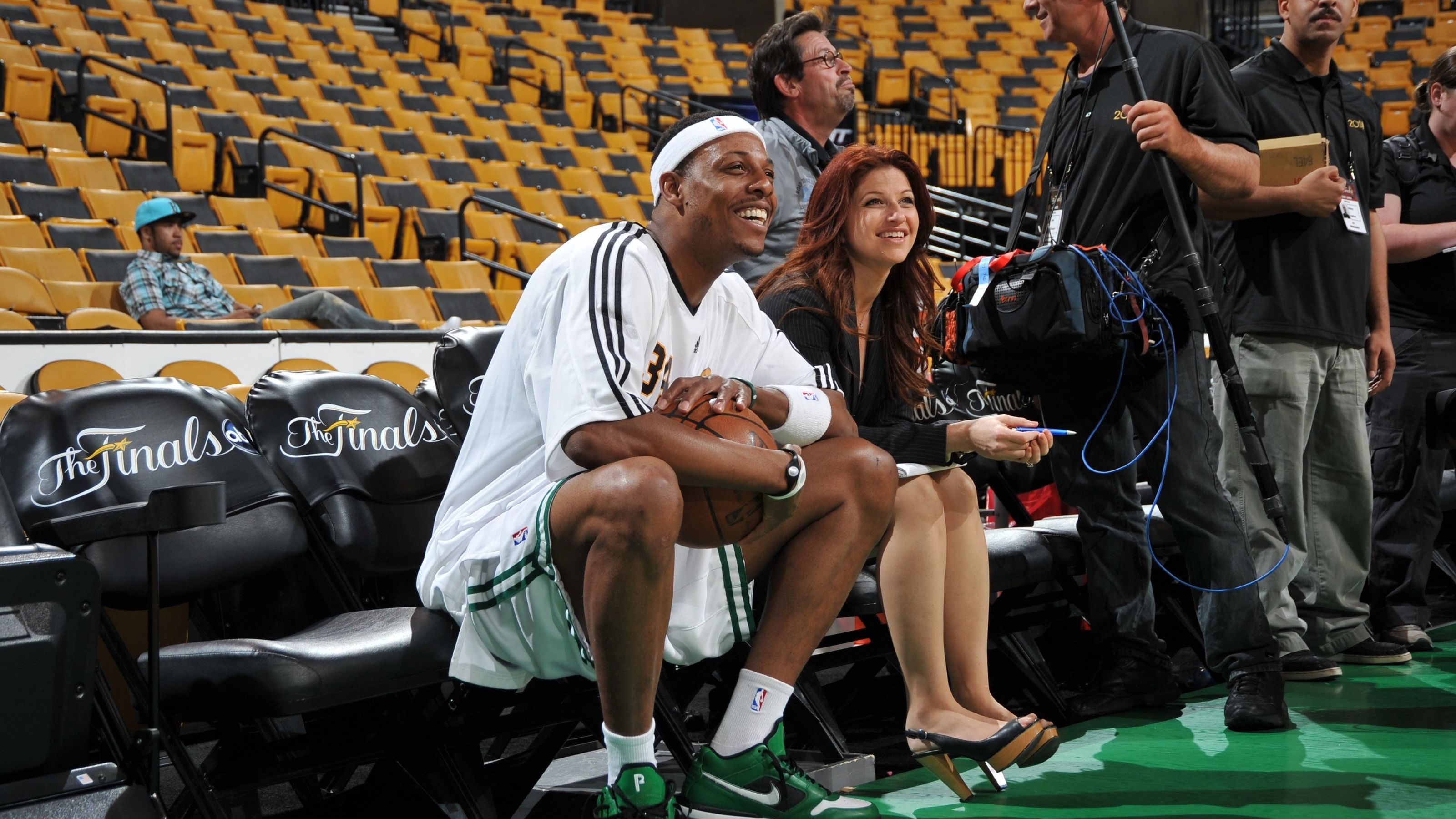Rachel Nichols Is One of the Sports World's Few Female Voices—but That's Not Why She's a Game-Changer
It's because she's not afraid to ask the tough questions. Here, writer Molly Knight puts her in the hot seat.


Before I sat down to interview ESPN host Rachel Nichols, I mulled over asking her what it's like being a woman in such a male-dominated industry. Then I thought better of it.
As a female sports writer I get the same question constantly from well-meaning people, and I trip over my words every time. I never know what to say—it's probably a lot like being a woman in any other profession, and also I've never been a man so I would have no idea what to compare it to.
Besides, Nichols isn't a big deal because she's a woman working in sports. She's a big deal because she's whip-smart, funny, and not afraid to ask tough questions of some of the most famous people on the planet. Her journalism chops brought her from the Washington Post to ESPN to CNN back to ESPN, but her warmth and relatability made her a star. Sports Illustrated has called Nichols "the country's most impactful and prominent female sports journalist;" The Hollywood Reporter named her one of the 10 most powerful voices in sports media.
Now the host of ESPN's daily basketball show The Jump, Nichols is focusing her immense talents on elevating NBA dialogue. We sat down near her studio in downtown Los Angeles for a candid chat—sports journalist to sports journalist—about taking charge when the ball's in your court.

Molly Knight: Why did you choose this career?
Rachel Nichols: I've always loved sports. When I was a kid it was just fun. Why wouldn't you want to work in a fun job? But I knew I wasn't going to be a professional athlete. And if you looked around at what jobs were available in sports, certainly at that time, you couldn't be a female team executive.
When I got older and thought about it more critically, I realized that what appealed to me was that when you go to a sporting event there's this whole story that happens in front of you. But you don't know what's going to happen. I always use this example: It's like Will Smith in the alien movie; maybe you go see the movie because you think it could be good or it could be funny or there are cool explosions, but in the end you know who is coming out of that movie. It's not the alien. It's Will Smith. But when you go to a sporting event you don't know which team is Will Smith and which team is the alien. If your job is to tell stories, it's so much more fun to do it if it's not all predetermined. And it seemed so much better than working in an office.
Get exclusive access to fashion and beauty trends, hot-off-the-press celebrity news, and more.
"We had a really honest conversation about why everyone hated him. He said he didn't want to be the villain anymore."
MK: You honed your skills at the Washington Post, reporting and filing stories every day. How did you make the transition to TV?
RN: When I was in D.C. and my job was to cover the Washington Capitals, the hockey writer would go on the pre-game show on the local cable network every pre-game to do a segment. So even as a newspaper reporter I was also becoming a TV reporter, kind of on the side.
The immediacy of television is really appealing. There are some stories that you can only tell in print because you are recounting a conversation or narrative that happened behind closed doors and it's only by talking to thirty different people and creating the tapestry that you can put it all together. But there are some situations where you show a clip of Michael Jordan and say, "Did you see that?" And I can write about that clip ten different ways and I'm never going to be able to do it justice.
MK: You've interviewed basically every notable sports figure of this generation. What interview stands out to you?
RN: I first did a project with LeBron James when he was in high school. To be able to talk to somebody at the age of 17 and now at the age of 32—to be able to have these hour-long sit-down check-ins with another human being would be pretty cool even if he was just the guy at the hardware store on the corner. But it's not the guy from the hardware store, it's one of the greatest athletes ever. To have a front-row seat into someone's life? It's been incredible.
We did an interview a year after "The Decision" [when James announced he was leaving Cleveland for Miami], when the NBA was coming out of the lockout and James had a tough year and lost the NBA Finals and didn't speak to anyone for a few months and went back into his shell. We sat down in Akron, Ohio, and had a really honest conversation about why everyone hated him. He said he didn't want to be the villain anymore.
I covered Serena and Venus Williams early in their careers. Getting to talk to them in those early moments—it was about a lot more than just winning a tennis tournament.
And obviously the interview I did with Floyd Mayweather. I think it helped elevate some of the conversations we had about him and about domestic violence. The interview itself was not an emotional fact-finding tour de force, but it served another purpose which I felt was valuable.
MK: I'm glad you brought up that Floyd Mayweather interview. It really was a watershed moment for the national conversation around domestic violence. I think it forced a lot of people to reckon with just how dangerous it is to worship a sports figure who has a history of abusing women. Most people turn to sports as a distraction from all the terrible things happening in the world, and they don't want to think about their favorite athlete being a terrible person. Did you feel the importance of that going into the interview?
RN: I do a lot of research before every interview I do. I sat down and read the police reports, I read the great reporting boxing journalists had done that hadn't gotten a lot of public traction. The context of it was really relevant to me; the interview happened right around the Ray Rice video [of him assaulting his then-fiancée in an elevator] coming out [in September of 2014]. So, to me—even though some of the incidents I asked Mayweather about had happened quite a bit in the past—it was relevant.
"If somebody does have a problem with something I say, my policy is, 'Call me. Let's talk about it.'"
He was in the middle of a promotional tour for a fight, so some people thought I had ambushed him. But it wasn't an ambush at all, not only because of what was going in the country, and in the sports world with Ray Rice, but because he had specifically commented on Ray Rice two days earlier. To me, Floyd Mayweather inserted himself into that conversation, and it became, OK, if this is something he's talking about, let's talk about it. I knew he probably wasn't going to be very receptive to that. But I had to ask what I wanted to ask and see how long he would stick around.
MK: Part of being a serious journalist is getting yelled at by publicists who want you to ask nothing but friendly questions. How do you deal with that?
RN: One thing to know going in is if you're asking questions because you're looking for an answer. You don't want to ask questions that are grandstanding. If you're really just asking for the truth, then it gets a lot harder for people to be legitimately offended.
I go to a lot of games and talk to players to find out what's going on before I form an opinion. And because I go to games, if somebody has a bone to pick with my opinion that's totally fair. There have been times I've had athletes text me after something I've said on TV, or it's gotten back to me through their PR that they didn't love what I said, but I've never had anybody say it was a cheap shot. I work really hard to prevent that. If somebody does have a problem with something I say, my policy is, "Call me. Let's talk about it."

MK: Something that always amazes me about on-air reporters is your ability to keep it together in situations that are often chaotic. How do you stay calm?
RN: I was a beat writer writing on deadline in an era where you had to file by a certain time or there was a hole in the newspaper. There was no Internet, no attitude of, "hey whenever you can put the story up!" So the game would end at 11 p.m. and by 11:08 p.m. I had to file something.
And like we were just talking about, about asking tough questions, when you are on a beat, you have to come back every day and see the same people, and do your job, which is to get information even if people don't like it. And if you go too far or you mess up you've got to turn around and deal with those same athletes and team members tomorrow. So you spend years learning how to be smart.
Those things prepared me to do the same on live television.
MK: I've definitely called an athlete by the wrong name before, which is probably the most embarrassing thing you can do in this job. Any embarrassing moments to share?
RN: We were in Buffalo after an NFL game. I was on Sportscenter live and it was one of those terrible winter days in Buffalo, I think gusts were like 65 to 70 miles per hour. It was freezing and I was standing on a riser and my footing was not great, and a gust of wind came while I was giving my report and I just flew off the box.
MK: Please tell me this exists on YouTube…
RN: Thankfully no, and people have looked!
"Fall" isn't even the right word. I was swept aside by the wind. I was literally moved across the screen. We got disconnected and I'm sure the anchor was like, "Well, we've lost Rachel."
But that's one of 100 things that's happened. It's live TV. You learn to roll with it.
"I have twin six-year-old daughters and I'm happy to know that they get to grow up watching me do something I'm really interested in, that I get to be curious about every day."
MK: Have you had a moment when it was difficult for you to keep your calm on air?
RN: I found out [veteran NBA sideline reporter] Craig Sager died less than two minutes before I had to go on the air. I want to say it was 90 seconds. I had been talking to Craig's son so I knew how sick he was, but some things had happened that week that had led me to believe that we had a little more time. The night before he died, I was thinking about how I needed to write some thoughts down so that I would have something to say when it happened, but I also didn't want to. I just really believed we had more time. To have ninety seconds to tell people and talk about it and be live on the air... Craig is somebody I looked up to tremendously for so long. He went to [my alma mater] Northwestern. He was the best at what he did. I worked with him at Turner for a while and got to know him very well. That was probably the hardest time I had on air.
MK: For most people, just finding out someone they love has died is difficult enough, but to have to go on television and tell the world... There's you the human, processing your emotions, and then you the professional. Did you compartmentalize and put the job first?
RN: I don't know. I just got through it. The only thought I had in those ninety seconds between when my producer told me in my ear and the light went on was, Do it right for him. He deserved that.
MK: Last year you started hosting your own daily sports talk show. How do you prepare for each episode? What is your day like?
RN: My work for the show starts the night before watching hours of basketball games that are happening. Social media has made watching NBA games really fun and communal—if something cool happens in the Memphis game or the Lakers game, people are tweeting about it. Sometimes I'll prep by going to the Lakers or Clippers game because the Knicks are in town or the Cleveland Cavaliers are in town and I want to talk to those players.
Our first meeting of the day is at 7 a.m. because even though we are on the west coast, the show is on at 3 p.m. Eastern time. I'm in awe of our producers and all the people who know how to do the things that I don't know how to do—finding the right videos and cutting them together. I am thrilled that the tone of our show is often clever and irreverent and that is one hundred percent because of the production staff and zero percent because of me.

Every show has a monologue, so I am in essence writing five columns a week. I spend the hours leading up to the show figuring out the issues I want to talk about. When you're a reporter, you're asking people what they think. After two decades I felt I had inputed information for long enough that I was qualified to output information. What appealed to me about this job was the opportunity to lead the conversation. So right at the top of the show I can set the tone with, Hey, here's an idea. And then sit around with some of the smartest people I know and talk about it.
You get people to tune in by saying something different or more layered than they're getting somewhere else. The misconception, though, is that it has to be the loudest. It just has to be the most interesting.
MK: I was going to ask you about working and being a mother to your twins but then I thought, Men never get asked about what it's like to host your own television show and also be a parent.
RN: Right, exactly.
MK: So I don't know how to form this question...
RN: I think the only thing that's smart for me to say is I have twin six-year-old daughters and I'm happy to know that they get to grow up watching me do something I'm really interested in, that I get to be curious about every day, and I can only hope for them that they get the same thing.
I really like what I do. I watch three hours of basketball a day because I really like it. I read everything because I really like it. I think honestly this needs to be true of whatever field you go into. I talk to college students a lot and this is what I tell them. Do something you really like. Because then the stuff that you're doing to become successful is the stuff you'd be doing anyway.
MK: What is it about basketball that you love?
RN: The immediacy of it. There are ten guys on a court and you can see everyone's face and you can hear them and watch what they're doing and see and feel what they're doing.
It's such a diverse sport, which allows for such diversity of thought. I really dig the NBA culture going on right now, the vibrancy of it, and how much of an influence it's having on the country and the world.
MK: I've had moments in my career where I've taken stock of what I'm doing with my life and asked whether writing about sports even matters, whether it's a good use of my time, and then realized what a role it plays in the lives of so many people. It can be such a saving grace for whatever people are going through in their lives, and a connection to their families—because fandom is often passed down from generation to generation—and also a place for people to find community. Sports is the only thing people watch live, and then you go online and have a conversation and you feel a part of something.
RN: Sports is the tent we all still gather under. If you look at voter turnout, it's down. If you look at attendance at religious services, it's down. People don't watch all the same TV shows anymore, they don't read the same newspapers. The one thing we all do is watch sporting events and it's become where we are having our national conversations. We've been having conversations about domestic violence because of sports; Colin Kaepernick really funneled and focused a conversation about police violence. And I could go on and on. There are just so many situations where, because we are all sitting there in an arena together, we are forced to talk about these big, important things.
Follow Marie Claire on Facebook for the latest news, fascinating reads, fun video, and more.
Molly Knight wrote about baseball for ESPN the Magazine for eight seasons. Her work has also appeared in The New York Times Magazine, Glamour, SELF, Vanity Fair, Baseball Prospectus, and Variety. Her first book, The Best Team Money Can Buy: The Los Angeles Dodgers Wild Struggle to Build a Baseball Powerhouse, was a New York Times Bestseller.
